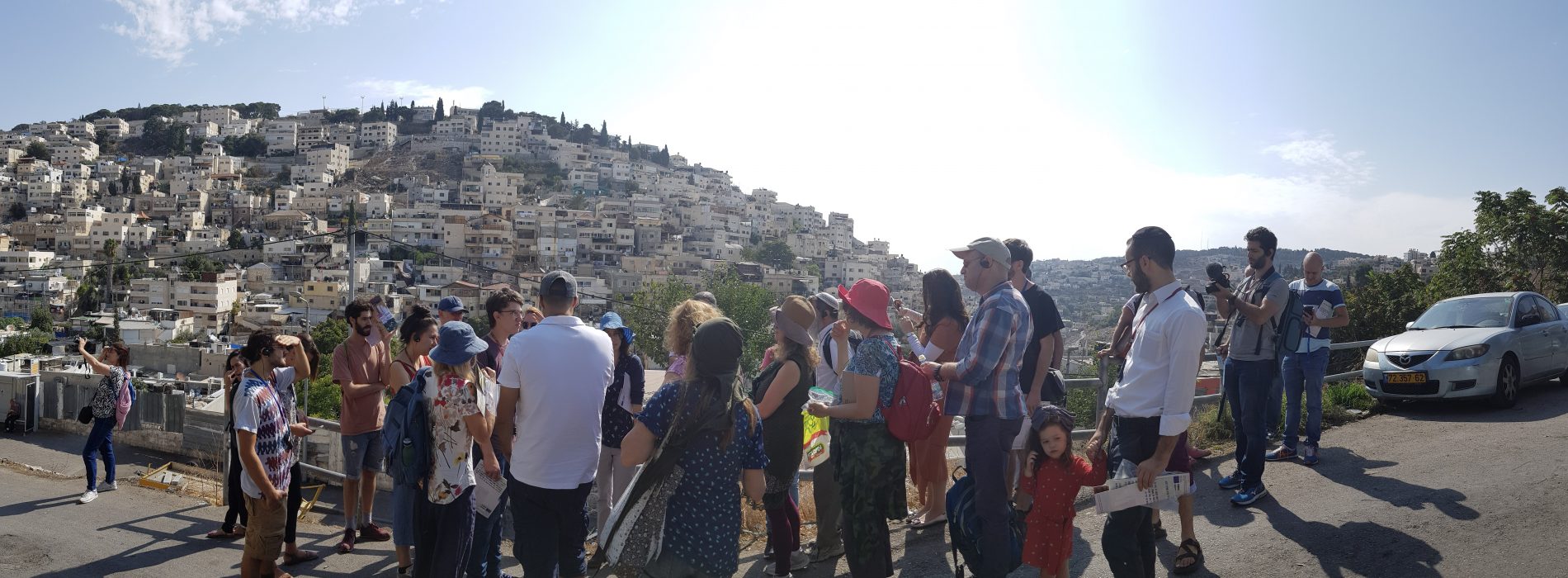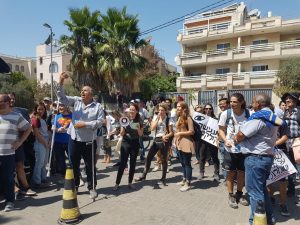- About Us
- Policy Center
- Learn
- Press Room
- Blog
- Get Involved
- Donate
- Donate to J Street Online
- Make a Gift in Someone’s Honor or Memory
- Make a Monthly Gift
- Tax-Deductible Donations
- Giving by mail

J Street’s “Our Israel” project spotlights the amazing Israeli groups who share our progressive vision for Israel, and who are helping build a society underpinned by the founding values of democracy, self-determination and equality which are enshrined in Israel’s Declaration of Independence.
“They don’t want Arabs here, or across East Jerusalem.”
By “they,” Abdelfatah Skafi was referring to ideological Israeli settlers, who are spearheading an effort to use discriminatory Israeli laws to evict a number of Palestinian families from their homes in the East Jerusalem neighborhood of Sheikh Jarrah. In May of 2021, an Israeli court was set to rule on whether some of those evictions, including that of Skafi and his family, would be permitted.
In anticipation of Israel’s court ruling in favor of the settlers, Palestinians in the neighborhood began to protest the evictions. As those protests grew in size and intensity, they were met with repressive force from Israeli police. Viral footage showed brutal overreactions from Israeli police, pelting crowds of protestors with stun grenades, skunk spray, and smoke bombs. The cycle of growing demonstrations and violence in response repeated itself for days on end. Eventually, Hamas used it as a pretext to launch indiscriminate terrorist rocket fire against Israeli cities, to which the Israeli Defense Forces responded with an intensive and destructive campaign of airstrikes on Gaza.
The unrest caught the world’s attention, prompting protests from Chicago to London to Sydney. Much of the coverage by Western media depicted the protests and the subsequent escalation as an almost random, out-of-the-blue occurrence. The reality is that the court case and protests that followed were the culmination of decades-long systematic discrimination, mistreatment and efforts by state-sponsored settler groups to displace Palestinians and assert control over larger portions of Palestinian neighborhoods in Jerusalem.

Israeli crane demolishes home.
Ir Amim, an Israeli non-profit which is focused on safeguarding the rights of both Israelis and Palestinians to live in Jerusalem and fostering conditions for an agreed resolution to the conflict, has seen the efforts to push Palestinians out of East Jerusalem play out on the ground.
“Home demolitions and evictions of Palestinians from East Jerusalem are part and parcel of the longstanding discrimination in Israel’s policymaking and legal system since the annexation of East Jerusalem in 1967,” said Amy Cohen, Ir Amim’s Director of International Relations and Advocacy. “The evictions are initiated by settler groups, who work with full cooperation from various state entities as part of Israel’s intentional policies to curb the Palestinian demographic in Jerusalem.”
Ir Amim uses a combination of public and legal advocacy, painstaking field research and reporting, and collaborative coalition building to push back on forces seeking to entrench Israeli control of East Jerusalem and foil prospects for a two-state framework with two capitals in Jerusalem.
The organization was founded in 2000 by a number of activists in the city, including current J Street staffer Amos Gil, in response to discriminatory Israeli policies and practices in Jerusalem that stretch back to 1967, when Israel annexed the eastern portion of the city. Three years after Israel’s unilateral annexation of East Jerusalem, Israel passed the Legal and Administrative Matters Law, which allows for Jews to reclaim property they or their families had lost in East Jerusalem in the 1948 Arab-Israeli War. Importantly, Israeli law, however, provides no parallel legal mechanism for Palestinians to reclaim property lost in West Jerusalem at the same time.
Starting in the 1990s, state-backed settler groups began using that law as a basis for evicting Palestinians from their homes in the city and supplanting them with Jewish settlers. As Israeli settler organizations have become more organized and gained power over the years, the number of these cases has sharply increased.

An eviction occurs in Silwan.
The process primarily occurs via eviction lawsuits filed by settler organizations, meaning disputes can often fly under the radar, and take years to be resolved. However, while the involvement of the courts gives the eviction process the veneer of legitimacy, it’s impossible to pretend that both sides in these “real estate disputes” (as described by the Israeli government) are being given fair treatment.
“Rather than adjudicating these cases from a broader perspective, which includes moral, geopolitical, and humanitarian considerations, as well as international human rights law, the Israeli courts instead uphold the institutional discrimination against Palestinians which is implicit within our legal system,” said Cohen. “Over time, as more and more rulings have come out in favor of settlers, the settler organizations have been emboldened and the number of eviction attempts has increased.”
As eviction efforts have ramped up, so too has the suppression of Palestinian residential development in East Jerusalem. Zoning plans of Palestinian neighborhoods are either rarely drawn up and/or updated, which prevents Palestinians from obtaining building permits. As a result, Palestinian families are often forced to build or renovate their homes without these permits, which subject their homes to the threat of demolition. Indeed over the past five years, enforcement and penalization of so-called building offenses have intensified, causing an unprecedented spike in the rate of home demolitions in East Jerusalem.
“The goal of such policies is simple,” said Cohen. “It is ultimately to push Palestinians out of the city and manufacture demographics that maintain a Jewish majority within Jerusalem. In doing so, it prevents Palestinians from claiming any part of the city as their own to thwart the prospect of East Jerusalem ever serving as the capital of a future Palestinian state. They’re doing the same thing with settlements across the West Bank–moving Israeli settlers in to undermine Palestinian claims to the land, thereby destabilizing conditions for a two-state solution.”

Ir Amim is on the frontlines of challenging the various policies aimed at achieving that goal. On behalf of families facing eviction all across East Jerusalem, but particularly in the neighborhoods of Sheikh Jarrah and Silwan, the organization has used powerful public and legal advocacy to obstruct the settlers’ agenda and call the Israeli government to account for its support of these measures.
They also focus heavily on empowering Palestinians to advocate for themselves. According to Cohen, “we work closely with communities being affected by these displacement processes to provide the tools by which they can advocate for themselves and their communities, including, when appropriate, legal advocacy.”
One community they have worked with is Al-Walaja, a Palestinian village located on the southern periphery of Jerusalem which is bisected by the city’s municipal border. Ir Amim assisted the village’s residents to submit a zoning plan that would allow for the residential development of their community and would legalize their homes that are currently under pending demolition orders. Yet due to longstanding discriminatory planning policies driven by political considerations, the residents’ plan was recently rejected by the planning authorities and is now being contested in court. While Ir Amim’s goal is to empower the residents with the tools they need to fight for their rights, they often face a system that is rife with obstacles and rigged against them. Recent events show just how important an empowered Palestinian community can be.
When Palestinians took to the streets in May 2021, they weren’t just protesting the specific eviction cases at issue in the Sheikh Jarrah neighborhood–they were objecting to the decades of injustice, discriminatory policies, and measures of displacement they’ve faced as settler groups and the Israeli authorities have pushed harder and harder to drive them from the city.
However, while their cause was not new, the widespread demonstrations across East Jerusalem, Israel, Gaza, the West Bank and many major cities around the world were.
“The grassroots awakening and mobilization among Palestinian youth in recent months was certainly unprecedented,” said Cohen. “After years of growing frustration, the eviction cases served as a lightning rod for nonviolent, civil resistance against the ongoing toll of the occupation and violation of basic rights. The unique convergence of antagonizing political decisions, police violence, and engaged, social media savvy youth, in a time where people wanted and were eager to listen allowed this issue to break through as none had before.”

Ir Amim and partner organizations protest police violence in Issawiya.
In the wake of this massive grassroots mobilization in May and the change in the Israeli government from a narrow right-wing government to a more broad and ideologically complex coalition, some activists have expressed hope that there is an opportunity for a policy change. According to Cohen, there still is much work to be done.
“The policies of discrimination that exist in Jerusalem did not start with former Prime Minister Netanyahu and the consecutive governments under his leadership, nor will they end with his replacement,” Cohen said. “It is encouraging to see a broader coalition that includes voices more aligned with the goals we would like to see carried out in the city; however, there are decades of inequity that must be reformed and it will take much more than a changed coalition to make a difference.”
While the new coalition may not want to do much in opposition to the processes of eviction, demolition, and settlement occurring in East Jerusalem, sustained pressure from the US government could force them to act.
“The US government should urge the Israeli government to freeze and ultimately end all demolitions and evictions facing Palestinian communities throughout East Jerusalem,” said Cohen. “The Biden administration has a unique opportunity here to compel Israel’s hand to advance equitable housing policies and to safeguard Palestinian rights to their homes and the city.”
In addition to calling for a halt to the eviction and demolition processes, Ir Amim wants to see the US urge for wholescale policy reform on Israel’s part to uphold Palestinian rights to Jerusalem. That would include promoting equitable urban planning policies, drafting or updating zoning plans to allow for more residential development, and ultimately advancing a political solution to the conflict that grants Palestinians self-determination alongside Israel.
J Street has joined with Ir Amim in calling on the Biden administration to intervene and help stop the process of evictions and demolitions before hundreds more Palestinians in East Jerusalem are forced from their homes. If you’d like to help out in the effort to end this unjust practice, please join our movement by signing up below.